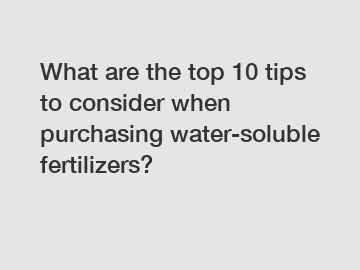What are the top 10 tips to consider when purchasing water-soluble fertilizers?
When it comes to maximizing crop yield and ensuring healthy plant growth, choosing the right water-soluble fertilizer is of utmost importance. With a plethora of options available in the market, it's essential to consider several factors before making a purchase. In this blog, we will discuss the top 10 tips to consider when purchasing water-soluble fertilizers, helping you make an informed decision for your farming or gardening needs.
1. Understand Your Plants' Nutritional Requirements:
Each plant has unique nutrient requirements at various growth stages. Before purchasing any water-soluble fertilizer, it's crucial to understand the specific needs of your plants. Conduct soil tests or consult an agricultural expert to determine the precise composition of essential nutrients necessary for your crops.

2. Look for Balanced Formulations:
Ideally, opt for water-soluble fertilizers that offer a balanced mix of macro and micronutrients. Essential macronutrients include nitrogen (N), phosphorus (P), and potassium (K). Additionally, look for fertilizers that provide a range of micronutrients like iron (Fe), manganese (Mn), and zinc (Zn) for optimal plant health.
3. Consider Solubility and Absorption Rates:
Water-soluble fertilizers should dissolve easily and be readily absorbed by plants. Ensure the fertilizer you choose has a high water solubility rate, as this will ease application and improve nutrient availability to plants. Quick solubility prevents clogging in drip irrigation systems or spray nozzles, enabling efficient nutrient distribution.
4. Evaluate pH Stability:
The pH level of water-soluble fertilizers can impact nutrient absorption by plants. Look for products that maintain a consistent pH level to ensure the stability and availability of essential nutrients. A pH range of 5 to 7 is generally considered ideal for most crops, as it promotes efficient nutrient uptake.
5. Opt for Quality Brands:
Investing in reputable and trusted fertilizer brands ensures high-quality products. These brands often adhere to strict quality control standards, employ advanced manufacturing technologies, and conduct extensive research and development. Choosing quality brands enhances the chances of obtaining superior fertilizers, thereby enhancing your crop's growth and productivity.
6. Consider Environmental Impact:
Water-soluble fertilizers have the potential to leach into water bodies, contaminating natural resources and harming aquatic life. Opt for fertilizers with minimal environmental impact by selecting products that promote controlled-release of nutrients or those specifically designed for use in environmentally sensitive regions.
7. Assess Nutrient Ratios and Customization Options:
Different crops require varying nutrient ratios during different stages of growth. Ensure that the water-soluble fertilizer you choose offers customizable nutrient ratios, enabling you to tailor the fertilizer as per the specific needs of your plants. Customization options allow you to maximize nutrient uptake, promoting healthy growth and avoiding nutrient imbalances.
8. Evaluate Cost-Effectiveness:
While it is necessary to invest in quality fertilizers, the cost-effectiveness of the product should also be considered. Compare prices, nutrient concentrations, and the recommended application rates of different fertilizers. Calculate the cost per nutrient unit to determine the most cost-effective option for your farming or gardening needs.
9. Seek Expert Advice:
Consulting agronomists or agricultural extension services can provide valuable guidance when selecting water-soluble fertilizers. These experts possess in-depth knowledge of local soil conditions, crop requirements, and can recommend appropriate fertilizers suitable for your specific growing conditions. Their expertise can help optimize your fertilizer usage, enhance crop yield, and minimize nutrient wastage.
10. Consider Application Convenience:
Lastly, consider the ease of handling and application. Some water-soluble fertilizers come in pre-measured packets or tablets that simplify the mixing process. Others may require special equipment or additional steps for proper application. Assess the practicality of the fertilizer's packaging and application instructions to ensure seamless usage.
Conclusion:
Selecting the right water-soluble fertilizer for your crops is a critical decision that can impact plant health, growth, and overall yield. By considering the top 10 tips provided in this blog, you can make an informed choice, ensuring that you provide your plants with the necessary nutrients in the most efficient and effective way. Remember, investing time and effort in choosing the right water-soluble fertilizer will ultimately yield bountiful rewards in terms of healthy, thriving plants and increased harvests.
For more information, please visit NPK Water Soluble Fertilizer, water soluble fertilizers npk, NPK 15-5-20 compound fertilizer.
397
0
0


Comments
All Comments (0)